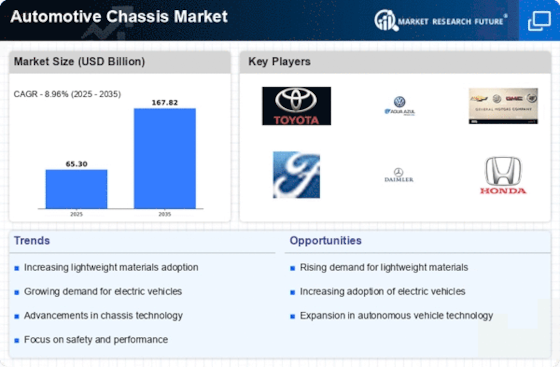Top Industry Leaders in the Automotive Chassis Market

The automotive chassis market, the bedrock of vehicle performance and safety, is undergoing a transformative journey. This complex ecosystem is characterized by established giants, nimble innovators, and disruptive trends reshaping the competitive landscape.
Key Players and Their Strategies:
Continentals, ZFs, and Magnas: These established European and North American players continue to lead the pack, leveraging their extensive product portfolios, robust R&D capabilities, and global manufacturing footprints. Their strategies focus on optimizing existing chassis designs, venturing into lightweight materials like aluminum and composites, and catering to the growing electric vehicle (EV) segment with modular platforms and battery integration solutions.
Asian Powerhouses: Companies like Aisin Seiki and Hyundai Mobis are making their mark with cost-competitive offerings and strategic partnerships with major automakers. They are actively targeting emerging markets and expanding their geographical reach to diversify their customer base.
Tier 2 Suppliers: CIE Automotive, Benteler, and AL-KO are pushing the boundaries of innovation through specialized chassis components and sub-systems. These Tier 2 suppliers collaborate closely with OEMs and Tier 1s, bringing unique expertise in areas like suspension systems, steering components, and chassis modules.
Factors for Market Share Analysis:
Technological Prowess: Continuous advancements in material science, automation, and software integration are crucial for differentiating offerings. Investment in R&D for lighter, stronger, and more intelligent chassis designs holds the key to market dominance.
Regional Dynamics: Growth is likely to be skewed towards Asia Pacific, driven by surging vehicle demand and government policies favoring fuel efficiency and electrification. Europe and North America, though mature markets, offer opportunities in premium and niche segments.
EV-Specific Adaptations: The rise of EVs necessitates specialized chassis platforms incorporating battery integration, improved weight distribution, and enhanced crashworthiness. Companies adapting their portfolios to cater to the unique needs of EVs will gain a significant advantage.
Emerging Trends and Strategies:
Modular Platforms: This approach allows for flexibility and scalability, catering to diverse vehicle segments and production volumes. Platforms with interchangeable components enable efficient customization and faster time-to-market.
Lightweight Materials: The race for fuel efficiency and range optimization in EVs has ignited a search for lighter yet robust chassis materials. Aluminum, composites, and even high-strength polymers are gaining traction, with companies investing in production and refining manufacturing processes.
Digital Chassis Architecture: Integrating sensors, actuators, and advanced software into the chassis is transforming its role from a passive structure to an active participant in dynamic vehicle control. This trend, driven by autonomous driving technologies, presents lucrative opportunities for players with expertise in software development and vehicle-to-everything communication.
Competitive Scenario and Outlook:
The automotive chassis market is on the cusp of a major transformation. While established players hold a strong position, the rise of Asian contenders, the influx of disruptive technologies, and the shift towards EVs are forcing a strategic rethink. Companies willing to invest in R&D, embrace new materials and technologies, and cater to the evolving regional dynamics will be the ones who steer the future of this critical automotive component.
To thrive in this dynamic landscape, players must:
Forge strategic partnerships and alliances to leverage diverse expertise and access new markets.
Maintain a customer-centric approach, catering to specific needs and offering customized solutions.
Prioritize sustainability and environmental consciousness by adopting responsible material sourcing and manufacturing practices.
Embrace digitalization and data-driven decision making to optimize processes and enhance operational efficiency.
The race for market dominance in the automotive chassis market is heating up. As technology advances and consumer preferences evolve, only those who adapt and innovate will emerge as future champions, shaping the very foundation of tomorrow's vehicles.
Industry Developments and Latest Updates:
Continental:
- Date: December 12, 2023
- Source: Continental press release
- Development: Continental announced a partnership with REE Automotive to develop and produce electric vehicle (EV) chassis platforms using REE's corner module technology. This technology integrates the motor, drivetrain, steering, and brakes into the wheels, freeing up space in the cabin and allowing for more flexible vehicle design.
ZF Friedrichshafen:
- Date: December 15, 2023
- Source: ZF press release
- Development: ZF unveiled its new ProAI central computing unit for advanced driver-assistance systems (ADAS) and automated driving (AD) functions. The ProAI is designed to handle the complex data processing requirements of next-generation vehicles, enabling features like Level 3 and Level 4 autonomy.
Magna:
- Date: December 19, 2023
- Source: Magna investor presentation
- Development: Magna announced plans to invest €500 million in its European electric vehicle (EV) production capacity over the next three years. The company is also developing a new EV chassis platform that can be used for a variety of vehicle types.
Schaeffler:
- Date: December 21, 2023
- Source: Schaeffler press release
- Development: Schaeffler introduced its new Integrated Chassis Actuator (ICA), which combines multiple chassis functions into a single unit. The ICA can be used to improve ride comfort, handling, and safety in vehicles.
Aisin Seiki:
- Date: December 22, 2023
- Source: Aisin Seiki press release
- Development: Aisin Seiki announced the development of a new lightweight chassis technology that can reduce vehicle weight by up to 15%. The company is targeting this technology for use in EVs and other fuel-efficient vehicles.
CIE Automotive:
- Date: December 26, 2023
- Source: CIE Automotive website
- Development: CIE Automotive is investing in the development of new chassis components for electric and hybrid vehicles, including lightweight battery enclosures and structural beams. The company is also expanding its production capacity for these components.
Top Companies in the Automotive Chassis industry includes,
Continental
ZF Friedrichshafen
Magna
Schaeffler
Aisin Seiki
CIE Automotive
Benteler
Hyundai Mobis
Ligier Automotive
Gestamp and others










